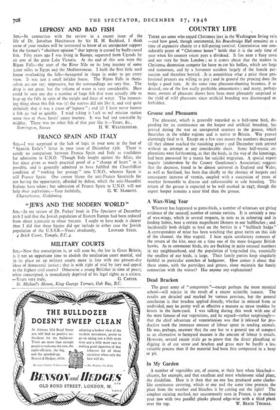COUNTRY LIFE
THERE are some who regard Christmas (not in the Washington Irving vein —and how good, though sentimental, his. Bracebridge Hall remains) as a time of expensiye charity or a bill-paying carnival. Contrariwise one con- siderable payer of "Christmas boxes " holds that it is the only time of year when his country estate pays a dividend. It lies near a busy, town and not very far from Landon ; so it comes about that the traders in Christmas decoration compete for leave to cut his hollies, which are large and numerous, and by a fortunate accident largely of the female per- suasion and therefore berried. ,It is astonishing what a price these pro- fessional pruners are willing to pay ; and in general the pruning does the hedge a good turn. At the same time pheasant-shooting becomes, if so desired, one of the few really profitable, amusements ; and many, perhaps most, owners of pheasant shoots have been most pleasantly surprised at the yield of wild pheasants since artificial breeding was discouraged or forbidden.
Grouse and Pheasants The pheasant, which is generally regarded as a half-tame bird, de- pending for its continuance on the keeper and artificial breeding, has proved during the war an unexpected contrast to the grouse, which flourishes in the wilder regions and is native to Britain. War proved alarmingly fatal to it. Except on a few rare moors the numbers decreased till they almost reached the vanishing point ; and December loth arrived without an attempt at any considerable shoo.t. Sonie half-mystiC ex- planations were forthcoming, as that the birds, in the way of the lemmings, had been possessed by a mania for' suicidal migration. A special, expert inquiry (undertaken by the County Gentlemen's Association) suggests that the decrease, found to be almost universal in England and Wales, as well as Scotland, has been due chiefly to the absence of keepers and consequent increase of vermin, coupled with a succession of years of weather favourable to disease and unfavourable to safe breeding. Thr return of the grouse is expected to be well marked in 5947, ahough the expert keeper remains a rarer bird than the grouse.
A Wax-Wing Year Whatever has happened to game-birds, a number of witnesses are giving evidence of the unusudil number of certain rarities. It is certainly a year of wax-wings, which in several respects, in note as in colouring and in feeding habits, bear a certain magnificent likeness to our bullfinches ; and incidentally both delight to feed on the berries in a " bullfinch hedge." A correspondent of mine has been watching that great rarity on this side of the channel. the blue wagtail. I hear again satisfactory rumours of the return of the kite, once on a time one of the more frequent British hawks. As to commoner birds, tits are flocking in quite unusual numbers in my neighbourhood, and the population of long-tailed tits, essentially the smallest of our birds, is large. Their family parties keep singularly faithful to particular stretches of hedgerow. How comes it about that these atoms, with the partridges and grouse, alone maintain the family connection with the winter? Has anyone any explanation?
Dead Bracken The great army of " composters "—except perhaps the more mystical school—will rejoice in the result of a recent scientific inquest. The results are detailed and marked by various provisos, but the general conclusion is that bracken applied directly, whether in minced form or undivided, may be pretty well as effective a manure as straw trodden by beasts in the farm-yard. I was talking during this week with one. of the most famous• of our vegetarians, and he argued—rather surprisingly— that the chief advantage of veketarianiSm was that it released for -Pro- ductive work the immense amount of labour spent in tending animals. He was, perhaps, unaware that the one bar to a general use of compost as an alternative to farmyard manure is the amount of labour it entails. However, several recent trials go to prove that the direct' ploughing or digging in of cut straw and bracken and grass may be hardly a less valuable process than if the material had been first composted in a heap or pit.
In My Garden A number of vegetables are, of course, at their best when bleached— chicory, for example, and that excellent and most wholesome salad plant, the dandelion. How is it then that no one has produced some cloche- like continuous covering, which at one and the same time protects the plant from the weather and bleaches •it by cutting out the light? The simplest existing method, not uncommonly seen in France, is to enclose your row with two parallel planks placed edge-wise with a third plank






























 Previous page
Previous page